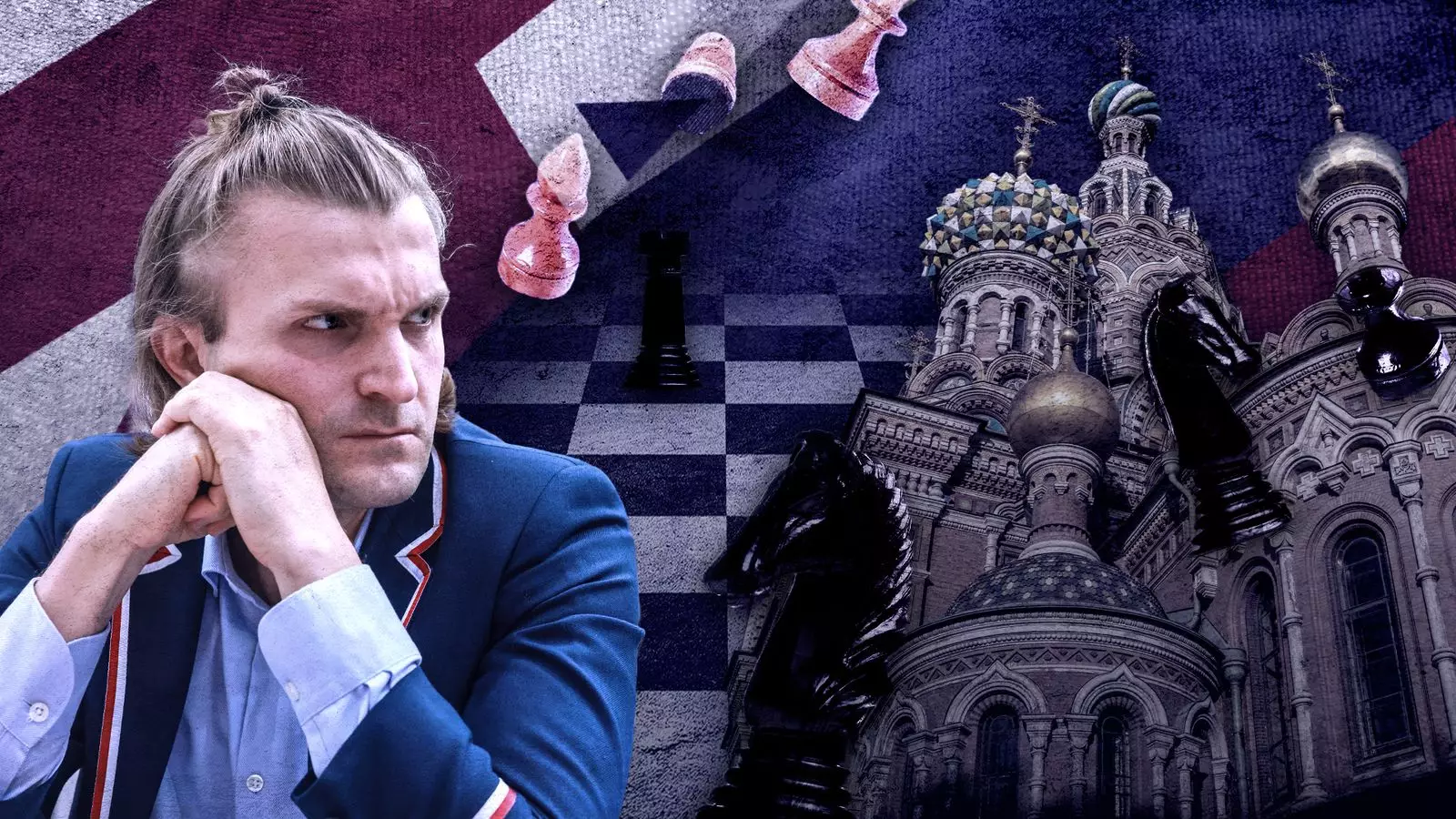For many, the external environment reflects internal emotions, and for Nikita Vitiugov, a chess grandmaster once celebrated in Russia, the melancholic weather of London has become a source of comfort. “The rain, the clouds, the lack of sun—I feel at home here,” he reflects, drawing parallels between this city and his native St. Petersburg. His statements encapsulate a shared sentiment among expatriates who find solace in familiar sensations, making London an unexpected refuge for a man of both intellect and sensitivity. As the world grows increasingly polarized, particularly in the wake of the conflict in Ukraine, Vitiugov’s personal journey serves as a microcosm of broader geopolitical shifts.
The chessboard may no longer symbolize the stark ideological battlefields of the Cold War, but it continues to possess a profound significance, particularly for Russian players who have faced immense scrutiny over their political stances. Vitiugov’s decision to speak out against the conflict has not just changed his residence but altered the course of his career and identity. “They consider London the capital of hell,” he remarks with a tinge of irony, suggesting the combat of narratives between nations engaged in a war of words as fierce as any chess match.
One might question the courage it takes to vocalize dissent in a nation where the winds of propaganda swirl so ferociously. For Nikita, this wasn’t merely a career quandary; it was a matter of principle. With Russia’s chess federation coming under fire from international peers and players banned from representing their homeland, the stage was set for a mass exodus of talent. Yet, for many, including Vitiugov, the decision was deeply personal. Having claimed titles and accolades within Russia, he faced an emotional reckoning—turning his back on a past laced with both pride and regret.
His swift transition to represent England was emblematic of a protracted struggle against authoritarianism. After the military aggression in Ukraine, he took to social media to declare, “Russians and Ukrainians are brothers, not enemies. Stop the war.” Such statements resonate powerfully in the chess community and reflect the poignant duality of his existence—once a celebrated figure in Russian chess, now a player championing freedom and dissent in a new diaspora.
Navigating the complexities of transferring his allegiance from Russia to England was fraught with challenges. Nikita had to contend with a bureaucratic maze that required hefty fees or prolonged periods of inactivity—a nightmare for any professional athlete. Yet, the outpouring of support from English chess officials made it possible for him to step into a new life. As he recounts this journey of liberation, one can sense both a heaviness of sacrifice and a lightness of newfound possibility.
“The hardest part was accepting that part of my life was over,” he admits, drawing a metaphorical parallel to divorce—a poignant analogy for anyone who has had to shed an identity entwined with personal and national pride. His successful transition, facilitated by a welcoming chess community, has transformed not only his career trajectory but also his family’s future. In London, Nikita finds a space where personal opinions can be expressed freely, a stark contrast to the societal constraints he left behind.
Despite the bittersweet nature of his departure, Vitiugov stands at a new precipice. With his family settled and a future blossoming, he embraces the opportunity to compete in notable events, including the upcoming London Chess Classic. This tournament serves not only as a personal milestone but also as a symbolic clash against some of the world’s elite players. He is determined to engage in friendly competition, even as the backdrop of London, particularly its vibrant chess culture, offers hope for a brighter tomorrow.
Vitiugov’s story continues to evolve, as he strides into a new era with lofty aspirations. Drawing inspiration from the likes of Viktor Korchnoi, a notable figure who similarly sought refuge from the oppressive grip of Soviet rule, he navigates the duality of his role as both a competitor and a mentor. His contributions to the English team revitalized its standing in the international arena, showcasing how personal odyssey can translate into collective gain.
As Nikita prepares for the British championships, he becomes more than just a player; he embodies the resilience of a generation grappling with conflict and identity. His existence in London is a testament to personal courage—a celebration of freedom amid a world increasingly riddled with uncertainty. Vitiugov’s legacy as a grandmaster transcends mere statistics on a leaderboard; it speaks to the transformative power of solidarity, where chess becomes a platform not only for competition but for human connection across divides. Will he emerge as a king of English chess? Time will tell, but his journey is already a victory in its own right.

Leave a Reply